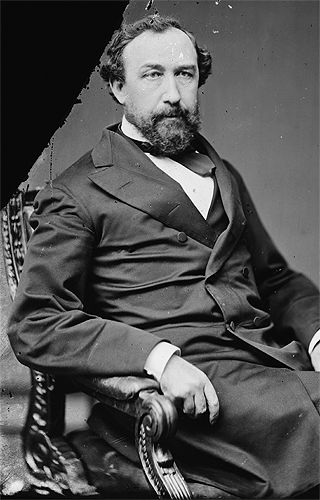This historical marker is also part of an online database of historical markers at HMdb.org here. I also found a link to a photo archive of the Booth Building on the Libray of Congress website here. From reading information on the website I discovered that the northern part of Booth Building burned down from a fire. This historical plaque is located on a newer, replacement section of the building that has encompassed the same look and feel of the original building. Also, there has been much renovation and updating done to this building which is apparent when comparing the pictures I took to the ones on the LOC.gov digital archive.

Newton Booth has a number of web links highlighting his life including
Wikipedia,
Governors.library.ca.gov and
Ancestry.com. The California Governors website says the following regarding Booth:
Newton Booth was raised in Indiana. He graduated from Asbury College in 1846 and then studied law. Booth moved to California in 1850 where he enjoyed success as a merchant and wholesale grocer before beginning his political career. Described as “above average in height, the slender and angular Booth had dark brown hair, blues eyes and wore a full beard. He dressed faultlessly and possessed agreeable and winning manners.”
In 1863, Booth served one year as State Senator. He was sworn into office as Governor on December 8, 1871. Construction of the state capitol completed and the state debt decreased during his term as Governor. In 1873, Booth helped organize a new independent republican political party, the "Dolly Vardens." The name, Dolly Vardens, came from a calico pattern of the time that was composed of many different colors and figures. Since this new political party was made up of a mix of “sore heads from any party or by any name,” the name seemed appropriate. With the support of the Dolly Vardens, Booth was elected to the U.S. Senate. He controversially remained in office as Governor until his swearing-in ceremony as Senator 18 months later. This questionable move prompted an attempt to amend the state constitution to prevent similar situations from occurring in the future.
A bachelor while in office, Booth married the widow of his former business partner in 1892. He died only five months later. Booth, considered one of the great public speakers of his day, died of cancer of the tongue.